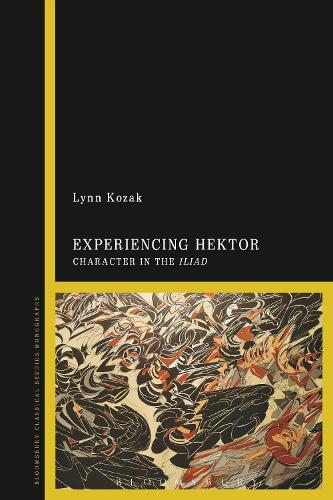
Experiencing Hektor: Character in the Iliad
(Hardback)
Available Formats
Publishing Details
Experiencing Hektor: Character in the Iliad
By (Author) Lynn Kozak
Bloomsbury Publishing PLC
Bloomsbury Academic
1st December 2016
United Kingdom
Classifications
Tertiary Education
Non Fiction
Literary studies: fiction, novelists and prose writers
883.01
Physical Properties
Hardback
328
Width 156mm, Height 234mm
635g
Description
This book is open access and available on www.bloomsburycollections.com. It is funded by Knowledge Unlatched. At the Iliad's climax, the great Trojan hero Hektor falls at the hands of Achilles. But who is Hektor He has resonated with audiences as a tragic hero, great warrior, loyal husband and father, protector of a doomed city. Yet never has a major work sought to discover how these different aspects of Hektors character accumulate over the course of the narrative to create the devastating effect of his death. This book documents the experience of Hektor through the Iliads serial narrative. Drawing on diverse tools from narratology, to cognitive science, but with a special focus on film character, television poetics, and performance practice, it examines how the mechanics of serial narrative construct the character of Hektor. How do we experience Hektor as the performer makes his way through the epic How does the juxtaposition of scenes in multiple storylines contribute to character How does the narrative work to manipulate our emotional response How does our relationship to Hektor change over the course of the performance Lynn Kozak demonstrates this novel approach through a careful scene-by-scene breakdown and analysis of the Iliad, focusing especially on Hektor. In doing so, she challenges and destabilises popular and scholarly assumptions about both ancient epic and the Iliads other hero.
Reviews
Though Kozak focuses on Hector, her study persuasively suggests that it is the charactersmajor, minor and red shirts alike that make the experience of the Iliad one that remains compelling * Religious Studies Review *
A stimulating book Kozaks approach is refreshing and exemplary. Although she does not specifically frame her work in this way, Kozaks investigation is a species of Homeric reception that helps us address the perennial question, Why Homer By comparing Homeric techniques to those of modern narrative art forms, Kozak has provided us another way to think about artistic and cultural continuities (and discontinuities). * New England Classical Journal *
In considering the narrative properties of the Iliad, scholars have often used the novel and its practices for comparison. In her lively exploration of the Iliads techniques of characterization, Lynn Kozak instead uses serial television as a comparandum Kozaks presentation of examples is extremely lucid. Even though I am unfamiliar with most of the series she uses to illustrate her points, I was able to understand her analogies easily and found many of them stimulating Such comparisons may also be helpful in the classroom in illustrating how the Iliad engages interest in character to students who may know and understand serial television better than literature. * Classical World *
Experiencing Hektor has much to offer both scholars and students. * The Classical Review *
Kozak analyzes the Iliad as serial narrative, showing how its story (consisting of beats, episodes, and arcs) can create rich and complex characters, like Hektor. Kozaks book is a must-read for fans of Homer and TV dramas alike. * Lorenzo F. Garcia Jr., Associate Professor of Classics, University of New Mexico, USA *
A bright and engaging approach to Homers Iliad, by a Homerist and self-confessed TV addict. Following the epic as though a TV serial, Kozak throws new light on Homeric composition. * Elizabeth Minchin, Emeritus Professor of Classics, The Australian National University, Australia *
Experiencing Hectors approach to the Iliad as a serial narrative not so unlike Game of Thrones or Breaking Bad is enjoyably defamiliarizing. It shows how frequently the poem shifts our sympathies, and although its own focus is on Hector, it contributes to a richer understanding of the entire narrative. * Ruth Scodel, Professor of Classical Studies, University of Michigan, USA *
Enjoyable The main strength of Kozaks treatment is its insistence on taking the Iliad as a work to be performed and received sequentially Her work stands apart for carrying the exercise through to an unusual extent. * Bryn Mawr Classical Review *
An interesting and useful "lens" through which to view ancient epic. What is formative and makes Kozak's book especially worth reading is her constant reminder of narrative time on almost every page, and her determination to try to "see" Homeric performance from the "viewers'" vantage point. * The Classical Journal *
Author Bio
Lynn Kozak is an Associate Professor at McGill University, Canada. She is the founder and artistic director of the McGill Classics Play and the co-founder and artistic co-director of Oimoi Productions.
